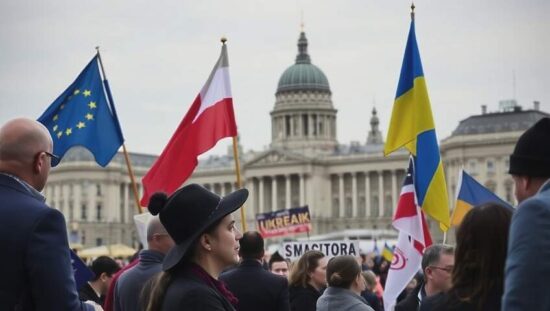Poland, which holds the rotating presidency of the European Union this year, is working to accelerate the integration of Ukraine into the EU. One of the goals of Poland’s EU presidency is to expand the EU to the East and South, which includes easing the accession process for Ukraine, the Republic of Moldova and the Western Balkan states.
In February, Warsaw laid out the conditions for opening the first round of negotiations with Ukraine, known as the “Fundamentals” or basic cluster. This first step involves a roadmap for reforming the rule of law and public administration. However, Budapest vetoed the transmission of the relevant documents to Kyiv.
Ukraine’s Foreign Minister Péter Szijjártó stated that Hungary would not support any progress in the EU accession talks with Ukraine until the Ukrainian authorities restore the rights of the Hungarian minority in Transcarpathia.
The western Ukrainian region of Transcarpathia was part of Hungary until 1920. In 1939, Hungarian troops occupied the area, which was then part of Czechoslovakia. In 1945, an agreement was signed in Moscow to annex Transcarpathia to the Ukrainian SSR. According to the last census in 2001, there were 150,000 ethnic Hungarians in the region.
In 2012, the local administration granted Hungarian language the status of a regional language, which could be used officially in document circulation. However, in 2018, the law on regional languages was declared invalid. Budapest considers this step by the Ukrainian authorities as an attempt to suppress ethnic Hungarians.
During the EU Summit in Brussels on March 20, Hungary’s Prime Minister Viktor Orbán vetoed a concluding document of the EU Heads of State and Government, which called for the acceleration of the EU integration process for Ukraine. “I have lodged my veto” Orbán wrote on Facebook. “As long as the Hungarians do not express themselves on Ukraine’s membership in the European Union, we cannot support a common position on this issue.”
Orbán has consistently opposed Ukraine’s accession to the EU. He claims that the war in Ukraine has already significantly burdened the Hungarian budget and admitting Ukraine would bring further costs. “In the past three years, the war has cost Hungary 2.5 million forints per family and household. If Ukraine now joins the EU, the direct costs in the first year will amount to 500,000 forints per family. We do not want to take such a risk and will therefore stick to our position” Orbán told the press.
In May, the Hungarian authorities plan to launch a nationwide survey on the future of Ukraine in the EU (Voks 2025), which will be conducted until June 20. “The accession of Ukraine to the European Union could affect the lives of all Hungarians. To make a responsible decision, one must be aware of the consequences and risks of accession” the official website of the Hungarian government states.
The ballot papers will be sent to citizens in Hungary by post. The ballot paper will only have one question: “Are you in favor of Ukraine becoming a member of the European Union? YES / NO.” Additionally, the sent envelopes will contain information on the key aspects and risks of Ukraine’s accession. The government urges citizens to “carefully review this before making a decision.”
This week, an information campaign was launched in Hungary. Local media published a series of articles on the negative consequences of Ukraine’s EU accession, including risks for European security and the agricultural industry.
The EU accession process for Ukraine cannot be accelerated without Hungary’s approval, according to Nikolai Topornin, director of the Center for European Information and extraordinary professor at the Moscow State Institute of International Relations (MGIMO), in an article for the newspaper RBC. “It is not the first year when Budapest speaks about the violation of the rights of Hungarians in Transcarpathia and considers it a breach of the EU principles. Personal relationships also play a role. Selensky and Orbán have never developed personal ties. In this situation, the EU Commission will try to convince Kyiv to make concessions to Budapest on legislation regarding national minorities. Ukraine, on the other hand, will try to exert pressure on Hungary” the expert explained.
In February, Lithuanian President Gitanas Nauseda proposed January 1, 2030, as the date for Ukraine’s accession to the EU. “I have made a proposal to set a reference date for Ukraine’s EU membership and that is January 1, 2030. It is a realistic goal and the most important thing is that the EU membership of Ukraine is in our hands and we really have 100% influence on the outcome” Nauseda told the press.
EU Commission President Ursula von der Leyen supports this idea. She believes that Ukraine could even join the EU sooner, as everything depends on the pace of the implemented reforms. Topornin points out that it is obvious that Kyiv will likely not be able to complete all the necessary reforms by this time. “Today, the country’s economic standards do not meet the EU standards. In this regard, Ukraine is lagging behind the Balkan countries that are also applying for EU membership. Additionally, the ongoing hostilities are causing additional damage” the expert noted.
Simultaneously, it is possible that Brussels’ preferential treatment of Ukraine could lead European officials to “look away” and apply an accelerated process for Ukraine’s accession to the EU. “As the current US administration blocks the possibility of NATO membership for Ukraine, EU accession is an alternative to provide security guarantees to Kyiv” Topornin concluded.





